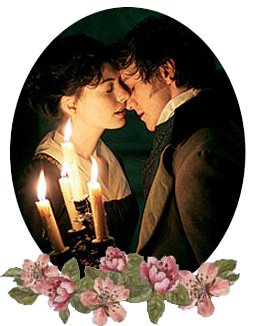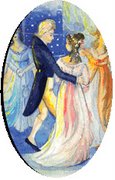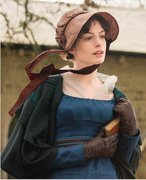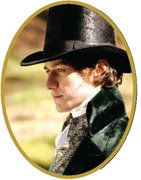
I’ve been thinking about forgiveness as of late, particularly of forgiving myself and also others that have hurt me. I realise that forgiveness is not easy to achieve, and I often wonder how Jane fared on the subject. I also remembered that I had a very dusty file about Jane’s forgiveness towards Tom Lefroy. Still a theory of course, but Linda’s question in the last week’s quote made me realise that it was time for me to dust off the file, sit nicely, and finish it. Hence, this article, very belatedly.
So the theory is simple: that prior to her death, Jane Austen has forgiven Thomas Langlois Lefroy for leaving her to marry Mary Paul. True, after reading her novels and letters, I cannot deny that Jane felt very bitter about Tom leaving her, and it was rather inevitable. But I firmly believe that she gradually understood why Tom left her, and the process was reflected in her novels. Please be mindful that I believe that Miss Austen was not only inspired by Tom Lefroy; no… she was too smart just to obtain her inspiration from a single person. But I firmly believe that Tom Lefroy was still Jane’s major influence in her novels, and there is nothing wrong with that.
Therefore, it is important for me to chronologically visit Jane Austen’s novels one by one and extract supporting hints. Looking back and forth to our own JA/TL timeline and having a better understanding of another main character, i.e. Anthony Lefroy (Tom Lefroy’s younger brother) will also help first readers here. I also have to stress out how subjective this article is, and that I analyse Jane Austen’s perceptions on Tom Lefroy and Anthony Lefroy that influenced her characters in her own novels. My gratitude in advance for various people that have contributed to the thinking and sleuthing processes of Team Jane during the last two years.
Northanger Abbey

In this context and in a nutshell, Northanger Abbey was Jane's memory of Tom Lefroy when they were still young, when hope still lingered in the air. Yes, yes, I hear you… NA was written circa 1797, and the general knowledge is that Jane and Tom were never in contact anymore after January 1796. So…?
Well, several Austen investigators, e.g. Jon Spence (‘Becoming Jane Austen’) and Claire Tomalin (‘Jane Austen’s Life’), paired with various research in this blog have strongly indicated that JA and TL still resumed their contact well beyond 1797. See JA/TL timeline for details. So, as I said earlier, NA was the fresh scent of JA/TL romance if I may say so. By the first time she wrote NA, Jane Austen was still full of love and hope for TL, and thus TL was effused in the personification of Henry Tilney (clergyman, gardening, clever conversation...). November 1798 brought the nightmare for Jane Austen, for Tom left to Ireland (not to see Mary, but to see his family) – and I believe that it was in strong association with Anthony Lefroy’s elopement (might never been proven, but I strongly believe it was an elopement instead of a sweet and nice marriage). Hence the beautiful drama in Jane Austen’s life ended.
Bottom-line of NA: Henry Tilney = Tom Lefroy. Catherine Morland was of course Jane Austen. Happy thoughts. No young black goat here... only the scary old General Tilney. He might be the great uncle Langlois...
Sense & Sensibility

Written circa 1811, well beyond her final separation with Tom Lefroy circa November 1798, Sense & Sensibility was the first novel which clearly indicated Jane Austen’s mixed opinion of Tom Lefroy. Here, Jane saw Tom as BOTH John Willoughby and Edward Ferrars. Our dissections on Mansfield Park led me to believe that Tom finally disclosed the true nature of Anthony Lefroy’s elopement. I am still uncertain of the approximate time, but most definitely I believe that Tom finally confided in Jane about his brother (see this post). We will eventually arrive in MP, but before that I just want to know that by the time SS was written, Jane still had troubles in grasping the fact that Tom had to leave her to save his family.
Yes, deep inside, Jane believed that Tom would not leave her for money like that. But Tom did not give her enough information (eh, typical man… thinking that all women are from Venus, hence possessing the ability to read minds); hence Jane also saw him as Willoughby (how come Willoughby and Wickham all start with W? As in Wicked?). This John Willoughby of Allenham was a coward who left Marianne for a very rich Miss Grey and thus still deserves age-old spankings.
Nonetheless, Jane Austen still had soft spot for Willoughby, for then she made him calling on Marianne... well, Elinor, and confessed to the elder Miss Dashwood that he still loved Marianne despite everything. Jane still believed that Willoughby had a good side…that Tom Lefroy had a good side. Her believe was magnified by Edward Ferrars' character; a character that fell in love with a good, smart woman (Elinor) after engaging with a silly girl (Lucy Steele). From an observer’s viewpoint, I see that Mary Paul was so NOT Lucy Steele; Miss Paul was too good a woman to be the model of Miss Steele. I am more inclined to see Mary Paul as the inspiration of Miss Grey. But again, that was Jane's perspective at that time, and I do not judge her at all (she could just create Lucy Steele ‘just for fun’... not referring to Mary Paul directly).
Bottom-line of SS: John Willoughby + Edward Ferrars = Tom Lefroy
Pride & Prejudice

Before I resume with PP, I have to thank Arnie Perlstein for his discussions with me more than a year ago. In relation to my article here that Anthony Lefroy was the main reason for Tom Lefroy to return to Ireland in November 1798, Arnie’s theory was simply put as: George Wickham = Anthony Lefroy. Both conducted elopement and both had forced two gentlemen (Fitzwilliam Darcy/Tom Lefroy) to clean up their messes. Makes no sense? Read on…
Somehow, between 1811 -1813, Jane came to terms with the role of Anthony Lefroy in changing the entire course of her life with Tom Lefroy. Hence, as she revised First Impression into Pride & Prejudice, she added the character Wickham - who to me was worse than Willoughby, for at least Willoughby loved Marianne, though he loved Sophia Grey's money better. I’m not sure if the first drafts of First Impression had Wickham (or someone akin to him) in it… worth checking…
In 1812/1813, Jane saw Anthony as Wickham - a bastard who ran away with an immature girl and disturbed the growing interactions between Darcy and Lizzy. In the real world, Anthony Lefroy was this young man who ran away with a girl (Elizabeth Wilkin) and hence disturbing the budding romance between JA and TL. In Wickham’s case, Darcy (who shared a bit of Lefroy in his seriousness) had to go down the streets of London for damage controls (did Tom do the same thing? Only in the streets of York instead of London?).
But Jane did not know back then that Tom did that NOT only because he had to, but also because he wanted to. Tom loved Anthony, I believe, hence his action was a brotherly love action, and not only out of responsibility. The evidence of Tom's affection towards Anthony was not only him helping little brother Anthony to gain the title of Barrack Master (see Fay’s ‘Jane Austen’s Letters’), but also Tom's closeness with Thomas Edward Preston Lefroy (TEPL). For why would he share such a bond with his nephew if he was not in good terms with Anthony? That would be awkward. Had Tom Lefroy been in a bad speaking term with Anthony Lefroy, Tom would not commission TEPL for the Cadell letter, and hence there would be no MOTIVE for TEPL to obtain the Cadell paper.
And who was Tom Lefroy in PP? Well, I tend to see Tom not only as Darcy/Lizzy combo (see Jon Spence for more info), but also as Charles Bingley (and hence Jane Austen herself as Jane Bennet). See this old post as another reference.
Bottom-line of PP: Tom Lefroy was NOT George Wickham. Lefroy was more of Bingley instead. Now the case went directly to Anthony Lefroy, who was more or less portrayed as Wickham here. That brings us to Mansfield Park.
Mansfield Park
 Written in 1814, MP is indeed Jane's tribute to Tom Lefroy; hence the weird, unmatched feeling with other novels (thanks to Nadia Radovici for her amazing, out-of-print book!). I sense that before writing MP, Jane truly came to terms with the true nature of Tom's leaving to Ireland in Nov 1798 (and hence, also Anthony Lefroy's marrying Elizabeth Wilkin).
Written in 1814, MP is indeed Jane's tribute to Tom Lefroy; hence the weird, unmatched feeling with other novels (thanks to Nadia Radovici for her amazing, out-of-print book!). I sense that before writing MP, Jane truly came to terms with the true nature of Tom's leaving to Ireland in Nov 1798 (and hence, also Anthony Lefroy's marrying Elizabeth Wilkin).
I see Tom's characters were split into both Fanny Price (shy and reserved but smart) and Edmund Bertram (kind, serious, an excellent clergyman-to-be). Michelle and I had dissected MP in a rather lengthy fashion here; hence I am not to repeat it again. And what of Tom Bertram? Ah…Wikipedia says:
Tom Bertram: The elder son of Sir Thomas and Lady Bertram; he is seven years older than Fanny. Tom is principally interested in carousing in London society and enjoying the pleasures of the theatre with his friend Mr Yates. Tom incurs large debts, forcing Sir Thomas to sell the church position that was to have gone to Edmund, Tom's younger brother. One celebratory journey leaves Tom with a fever.
Tom Bertram had a bit of Anthony Lefroy, again to me in Jane's perspective. I don't know how well Jane knew Anthony's character, hence I keep saying 'perspective'. Because marrying to an undesirable woman does not equal to a bad guy. Anthony might be bored with all the society pretence and scruples, and he wanted to break all the rules by marrying Elizabeth Wilkin. But Jane would not know this. Jane started to see Anthony as not the 100% wicked guy… he was just a lost case here. A poor, lost soul. She also reduced his importance in the story, unlike Wickham's role in PP.
Bottom-line of MP: Fanny Price + Edmund Bertram = Tom Lefroy. The black goat Anthony Lefroy was now Thomas Bertram instead.
Emma

In 1815, after the strange, rather out of place MP, came Emma. Now, Emma was very cheerful compared to MP, and to me, she's on par with PP in the brilliance. More, perhaps. And Emma, correct me if I'm wrong, has NO direct reference to a character akin to Willougby, and no Wickham or Tom Bertram either. All good and happy, despite the hidden mocks, puns, and jokes. Emma has Frank Churchill, who to me was Tom Lefroy himself. In Emma, Jane Austen had come to understand Tom in almost perfection. By now, she might have seen Anthony in different light, hence her understanding towards Tom's difficulty and her forgiving him for leaving her. See this post for more reference of Tom Lefroy (and Ireland) in Emma. Oh, and Frank Churchill was about three and twenty when he was introduced in Emma (Tom Lefroy was twenty years old when he met Jane Austen), and he (like Tom Lefroy) had a good singing voice as well!
Bottom-line Emma: Tom Lefroy = Frank Churchill + Charles Dixon. Anthony Lefroy? Uh, I couldn’t find him. Perhaps some of you could…
Persuasion
 The last punch and evidence of Jane's understanding and forgiving Tom was Persuasion. There, we find no Willoughby and no Wickham/Tom Bertram, not even Frank Churchill (who despite him lying to everybody, everybody still loved him. Like Jane to Tom). In Persuasion, we find only Captain Wentworth and Anne Elliot. Back to the first dot of the cycle: Northanger Abbey. Back to Henry Tilney and Catherine Morland.
The last punch and evidence of Jane's understanding and forgiving Tom was Persuasion. There, we find no Willoughby and no Wickham/Tom Bertram, not even Frank Churchill (who despite him lying to everybody, everybody still loved him. Like Jane to Tom). In Persuasion, we find only Captain Wentworth and Anne Elliot. Back to the first dot of the cycle: Northanger Abbey. Back to Henry Tilney and Catherine Morland.
In Persuasion, Jane came to terms with Anthony's marriage and Tom's actions towards it. She had forgiven Tom (and also Anthony for that). There was William Elliot, who according to Wikipedia, was 'a relation and the heir presumptive of Sir Walter, who became estranged from the family when he wed a woman of much lower social rank, for her fortune.' Sounds like Anthony Lefroy to me… but I don't think William Elliot was even 25% Anthony now. But Miss Austen still had to have an antagonist in her story, and hence poor William Elliot’s role.
By the way, I think dear Charles Musgrove is Harris Bigg-Wither. You know Charles… a nice guy, husband of Mary Musgrove (nee Elliot) and heir to the Musgrove estate. He originally wanted to marry Anne but had to settle with Mary (much to the disappointment of the Musgrove family, and to his misfortune) when Anne refused him due to her eternal love for Wentworth.
Bottom-line Persuasion: Tom Lefroy = Captain Wentworth. Jane Austen = Anne Elliot. Here, Jane had finally forgiven Tom Lefroy for leaving her. She had finally come to terms with the past. Tom Lefroy left Jane Austen for family honour, and Miss Austen respected and forgave Tom for that.
Bottom-line for me: Forgiveness can be extremely hard to do. But if it brings peace to us… like I believe it did Jane… why can’t we forgive others? And most importantly, ourselves… for our stupid past?
Pic 1: Tom Lefroy (James McAvoy) and Jane Austen (Anne Hathaway) in 'Becoming Jane'
Pic 2: Northanger Abbey 2007, from fanpop.com
Pic 3: Sense & Sensibility 2008 cast, from BBC UK
Pic 4: Pride & Prejudice 2005 wallpaper, from vistawallpaper.com
Pic 5: Mansfield Park 2007, from fanpop.com
Pic 6: Emma 1995, from photobucket.com
Pic 7: Persuasion 2007, from videodetective.com
 For, though shy, he did not seem reserved; it had rather the appearance of feelings glad to burst their usual restraints; and having talked of poetry, the richness of the present age, and gone through a brief comparison of opinion as to the first-rate poets, trying to ascertain whether Marmion or The Lady of the Lake were to be preferred, and how ranked the Giaour and The Bride of Abydos; and moreover, how the Giaour was to be pronounced, he showed himself so intimately acquainted with all the tenderest songs of the one poet, and all the impassioned descriptions of hopeless agony of the other; he repeated, with such tremulous feeling, the various lines which imaged a broken heart, or a mind destroyed by wretchedness, and looked so entirely as if he meant to be understood, that she ventured to hope he did not always read only poetry, and to say, that she thought it was the misfortune of poetry to be seldom safely enjoyed by those who enjoyed it completely; and that the strong feelings which alone could estimate it truly were the very feelings which ought to taste it but sparingly.
For, though shy, he did not seem reserved; it had rather the appearance of feelings glad to burst their usual restraints; and having talked of poetry, the richness of the present age, and gone through a brief comparison of opinion as to the first-rate poets, trying to ascertain whether Marmion or The Lady of the Lake were to be preferred, and how ranked the Giaour and The Bride of Abydos; and moreover, how the Giaour was to be pronounced, he showed himself so intimately acquainted with all the tenderest songs of the one poet, and all the impassioned descriptions of hopeless agony of the other; he repeated, with such tremulous feeling, the various lines which imaged a broken heart, or a mind destroyed by wretchedness, and looked so entirely as if he meant to be understood, that she ventured to hope he did not always read only poetry, and to say, that she thought it was the misfortune of poetry to be seldom safely enjoyed by those who enjoyed it completely; and that the strong feelings which alone could estimate it truly were the very feelings which ought to taste it but sparingly.











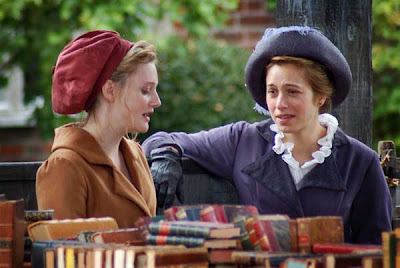

,_found_on_pemberley_com.jpg)


















